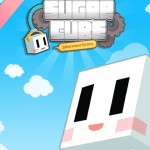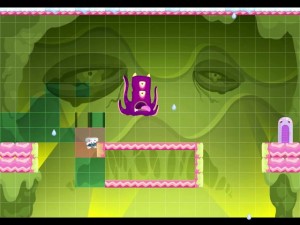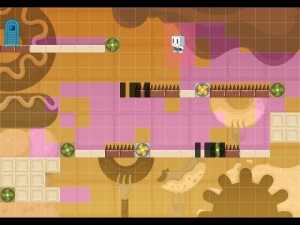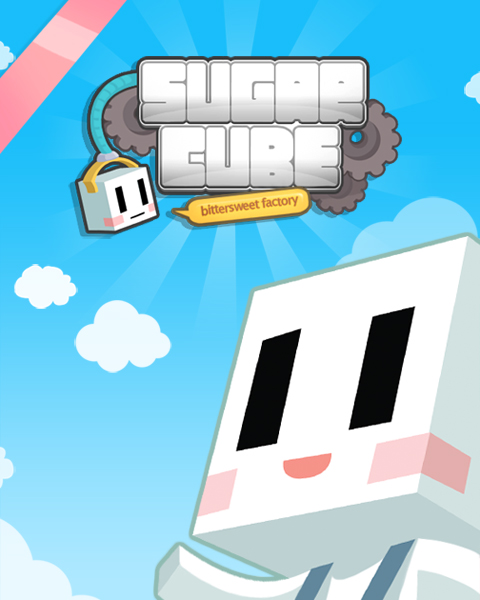 The retro 2D platformers just keep coming, and they don’t come much more indie than Sugar Cube: Bittersweet Factory. This new indie champ didn’t come from the bedroom of some reclusive coder in London though, its the winner of the Chinese IGF competition. Created by Turtle Cream, a little indie team from South Korea, the game captures the Zeitgeist of challenging, cute, classically put together platform games that evoke the best of the 8 and 16 bit eras. Sugar Cube is World 1-1, the Greenhill Zone and many others all rolled into one.
The retro 2D platformers just keep coming, and they don’t come much more indie than Sugar Cube: Bittersweet Factory. This new indie champ didn’t come from the bedroom of some reclusive coder in London though, its the winner of the Chinese IGF competition. Created by Turtle Cream, a little indie team from South Korea, the game captures the Zeitgeist of challenging, cute, classically put together platform games that evoke the best of the 8 and 16 bit eras. Sugar Cube is World 1-1, the Greenhill Zone and many others all rolled into one.
All of the above references will be familiar to anyone cool enough to visit CDT, but there are other, far more similar classic titles that you could mention that evoke Sugar Cube. Its visuals remind me of platformers from the Amiga and Atari ST generation. For example, the cute, candy-themed levels look like they are lifted straight from James Pond: Robocod, or even Zool. Those may be some obscure reference points, but while playing this I had a constant feeling of nostalgia I couldn’t shake until I realised what it was reminding me of. That’s not to say this is a bad looking game either. Although its visuals are similar in theme to those classic titles, there’s a high-res, sticky sweet, hard glazed prettiness to the game. Its all sharp edges and hard lines, and interestingly its visuals are not made up of big chunky retro pixels like in Super Meat Boy or Fez.
 The gameplay makes this as much puzzler as platformer. Its hard to explain the central idea behind Sugar Cube, but its fairly simple to understand once you see it in action. In effect, the game world is made up of tiles and moving past these tiles makes them flip from one side to the other. As such, when you walk past a tile it may flip to become a platform. At other times, moving past a tile while cause it to flip and remove an obstacle that’s in your way. Like I said, its hard to describe. Even when I put it down in writing I’m not entirely sure that the description I’ve given is correct, but once you start to play (or even just watch the video below) it will become much clearer.
The gameplay makes this as much puzzler as platformer. Its hard to explain the central idea behind Sugar Cube, but its fairly simple to understand once you see it in action. In effect, the game world is made up of tiles and moving past these tiles makes them flip from one side to the other. As such, when you walk past a tile it may flip to become a platform. At other times, moving past a tile while cause it to flip and remove an obstacle that’s in your way. Like I said, its hard to describe. Even when I put it down in writing I’m not entirely sure that the description I’ve given is correct, but once you start to play (or even just watch the video below) it will become much clearer.
Much of the puzzling involves going back and forth through a level, swapping tiles as you move and gradually building up a path of platforms for you to follow, all the while making sure to avoid flipping tiles that may block off your path. By holding down the shift key, you can also walk past tiles without flipping them. Suffice it to say later puzzles have complex combinations of holding and flipping tiles that make for some genuinely head scratching (and sometimes frustrating) situations.
 Thankfully the frustration is offset by clever design decisions. If you mess a level up too much its lighting quick to restart the whole thing. Similarly, if you die you are instantly respawned back where you started. Much like Super Meat Boy, the road to success is paved with (lots and lots) of failure. The clever part is that you never feel like you are stuck and the solution to a given level always feels like its just within reach. As you develop your own skills, tough levels that took you many frustrating minutes will take you only seconds to complete when you revisit them. Like the very best games of its type, you frequently reach skill plateaus where you stop and survey just how much you have developed as a player, before pushing on and learning even more.
Thankfully the frustration is offset by clever design decisions. If you mess a level up too much its lighting quick to restart the whole thing. Similarly, if you die you are instantly respawned back where you started. Much like Super Meat Boy, the road to success is paved with (lots and lots) of failure. The clever part is that you never feel like you are stuck and the solution to a given level always feels like its just within reach. As you develop your own skills, tough levels that took you many frustrating minutes will take you only seconds to complete when you revisit them. Like the very best games of its type, you frequently reach skill plateaus where you stop and survey just how much you have developed as a player, before pushing on and learning even more.
The levels are short and small and you will burn through them at a fair old pace early on before hitting some serious challenges later in the game. In some ways the bite-sized nature of the gameplay hints that this could be an ideal mobile game, but the fidelity of a controller (or mouse and keyboard) would be a big loss. Although its more about puzzles than platforming, there are still some tough jumps and you need to watch out for a whole range of baddies as you progress.
 While the actual game is polished and slick with some surprisingly catchy, well produced music, the way that you purchase it remains resolutely indie. Downloading the source from a site and running an .exe is a very old fashioned way of interacting with a PC game. A Steam release would be nice.
While the actual game is polished and slick with some surprisingly catchy, well produced music, the way that you purchase it remains resolutely indie. Downloading the source from a site and running an .exe is a very old fashioned way of interacting with a PC game. A Steam release would be nice.
There’s both fun to be had in Sugar Cube, and a sense of potential in it. Its a small, well formed package, but it hints at bigger and better things from Turtle Cream to come. Its a good wee game, but most importantly it hints at great things to come from this small team, and others talented eastern teams like them.
7 teaeth tingling sweet treats out of 10
